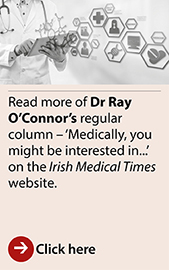Dr Ray O’Connor takes a look at the latest clinical articles on stress – and how it takes its toll on nurses’ and doctors’ health at work and home
Physicians have high responsibility, long work hours, and many work demands that can spill over into their home lives. This review article from the Mayo Clinic based in the United States of America1 considers the mental health of physicians as patients.
In 2020, only 43.6 per cent of physicians (as compared with 62.5 per cent of the general US working population) had satisfaction with work-life integration. Yet 72.2 per cent would choose to become a physician again, suggesting that most physicians find these trade-offs to outweigh the challenges.

Dr Ray O’Connor
Doctors have demanding careers and many stressors that make them vulnerable to burnout while they are also susceptible to substance abuse concerns and mental health issues just like the general population. Stigma remains a formidable barrier for physicians seeking appropriate help for mental health issues.
They may have concerns about potential impact that disclosure of a mental health issue may have on their careers. It is important to emphasize that seeking help is the right thing to do. Proper treatment should result in the best outcome for their careers because help seeking is a mature behaviour that is looked upon favourably by credentialing bodies and licensing boards.
Increasingly, state licensing boards provide ‘safe harbour’ language on licensing applications, allowing self-disclosure of an expanded range of physical and mental health conditions. Furthermore, proper treatment helps physicians live their best lives.
Nurses’ and doctors’ health at work is crucial for their overall performance and the quality of care they provide. While various instruments exist to measure health, an overview of instruments specifically designed for assessing nurses and doctors’ health is currently missing. This study2 provides a comprehensive overview of available health instruments specifically developed and validated for healthcare professionals in hospital care.
The authors’ search found 1204 studies that they included in their final analysis. The studies reported 986 unique instruments. From these they identified 32 comprehensive instruments suitable for broad health screening. Due to the large number of instruments, they were unable to assess validity and reliability outcomes in detail for each instrument.
Medical negligence claims are unfortunately becoming more common. It is estimated that most practicing doctors will face at least one claim in their careers. This paper3 looks at what the authors call ‘Medical Malpractice Stress Syndrome’. Litigation stress and medical malpractice stress syndrome can affect many spheres of a clinician’s life and can lead to the exacerbation of existing diagnoses including substance abuse disorders, depression, and anxiety.
The authors discuss the topic at length. Many useful strategies are suggested to help doctors cope with the stress. These include optimising wellness and self-care. Reframe litigation as a difficult event that gives you permission to make changes to support your well-being. Attend to exercise, nutrition, and sleep.
Nurture personal relationships (e.g., through quality time). Schedule time off from work to do something not associated with work. Consider reducing hours or taking a leave of absence if appropriate.
 There are also signs of increased stress at work among Norwegian physicians over the last decades, not least among general practitioners (GPs). In this literature review,4 the authors identify trends in both occupational stress and adverse work-related predictors of such stress and burnout in Norwegian physicians.
There are also signs of increased stress at work among Norwegian physicians over the last decades, not least among general practitioners (GPs). In this literature review,4 the authors identify trends in both occupational stress and adverse work-related predictors of such stress and burnout in Norwegian physicians.
Nine studies with observation periods of 1–20 years were included. The findings were that occupational stress among all doctors decreased gradually from medical school to 20 years later. The prevalence of an effort–reward imbalance increased fourfold among GPs during the period 2010–2019. Five studies reported higher levels of occupational stress among female physicians than among their male colleagues.
Work–home conflict levels increased after graduation until 10 years after leaving medical school and plateaued thereafter. Physicians who graduated in a later cohort reported lower levels of work–home conflict and less workplace violence. Work–home conflict, low colleague support, number of work hours and workload/low autonomy were all independent predictors of occupational stress.
Finally, this systematic review5 looked at the level of work stress and burnout among emergency physicians. The authors also sought to identify the effect of the specific work situation-related factors. The findings were that emergency physicians report higher scores of emotional exhaustion and depersonalization when compared to other healthcare professionals. Work characteristics contribute to this, but work-related traumatic incidents and aggression are important determinants.
Personal characteristics such as age, personality type D, previous experiences and coping strategies seem to be determining factors. Emergency physicians showed a high risk for developing burnout and work stress-related problems.
References:
- Couser G et al. Physician Health Series, Part 3: Physician Mental Health. Mayo Clin Proc. July 2024;99(7):1178-1186 n https://doi.org/10.1016/j.mayocp.2024.01.020
- Boskma A et al. Prioritising nurses’ and doctors’ health at work: a scoping review of monitoring instruments. BMJ Open 2024;14:e079861. doi:10.1136/bmjopen-2023-079861.
- Cocchiarale F et al. Medical Malpractice Stress Syndrome. Emergency Medicine Clinics of North America Volume 43, Issue 1, February 2025, Pages 1-7. https://doi.org/10.1016/j.emc.2024.05.024
- Oftung B et al. Occupational stress among Norwegian physicians: A literature review of long-term prospective studies 2007–2019. Scandinavian Journal of Public Health, 2025; 53: 302–310. doi: 10.1177/14034948241243164.
- Somville F et al. Work stress and burnout among emergency physicians: a systematic review of last 10 years of research. Acta Clin Belg 2024 Feb;79(1):52-61. doi:10.1080/17843286.2023.2273611.

